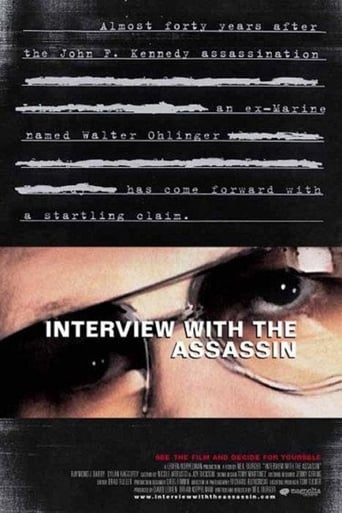Dallas. 1963. The second shooter.
"Interview with the Assassin," a gripping 2002 film by Magnolia Pictures, delves into the shadowy world of conspiracy theories and political intrigue. Directed by Neil Burger, the movie presents a fictional narrative where an unknown man, Walter Ohlinger, claims to be the real assassin behind the assassination of President John F. Kennedy. The story unfolds through the lens of a local television cameraman, Ron Kobeleski, who stumbles upon Ohlinger's confession and becomes entangled in a dangerous web of secrets and lies. Set in the United States, the film masterfully blends elements of thriller and drama, keeping viewers on the edge of their seats as they question the veracity of Ohlinger's claims and the implications of his revelations. The film's strength lies in its compelling performances and its ability to create a sense of paranoia and uncertainty. Raymond J. Barry delivers a chilling portrayal of Walter Ohlinger, a man whose calm demeanor belies the gravity of his accusations. As the story progresses, the tension escalates, and the audience is drawn deeper into the mystery. The use of a handheld camera adds to the film's gritty, documentary-like feel, enhancing the realism and urgency of the narrative. This stylistic choice effectively immerses viewers in the protagonist's journey, making them feel as though they are uncovering the truth alongside him. "Interview with the Assassin" also explores the broader theme of media responsibility and the impact of sensationalism on public perception. As Ron Kobeleski grapples with the ethical dilemmas of broadcasting Ohlinger's story, the film raises important questions about the role of journalists in shaping narratives and the potential consequences of their decisions. The movie serves as a cautionary tale, reminding audiences of the power of media and the need for critical thinking in the face of sensational claims. In conclusion, "Interview with the Assassin" is a thought-provoking film that successfully merges suspense with social commentary. Its exploration of conspiracy theories, coupled with strong performances and a gripping storyline, makes it a standout in the thriller genre. Magnolia Pictures' production not only entertains but also challenges viewers to consider the complexities of truth and the influence of media in our society.
Năm:2002
Ngân sách500000$
Thời lượng88 phút
Thể loạiPhim Chính KịchPhim Gây Cấn
Các quốc gia sản xuấtUnited States of America

